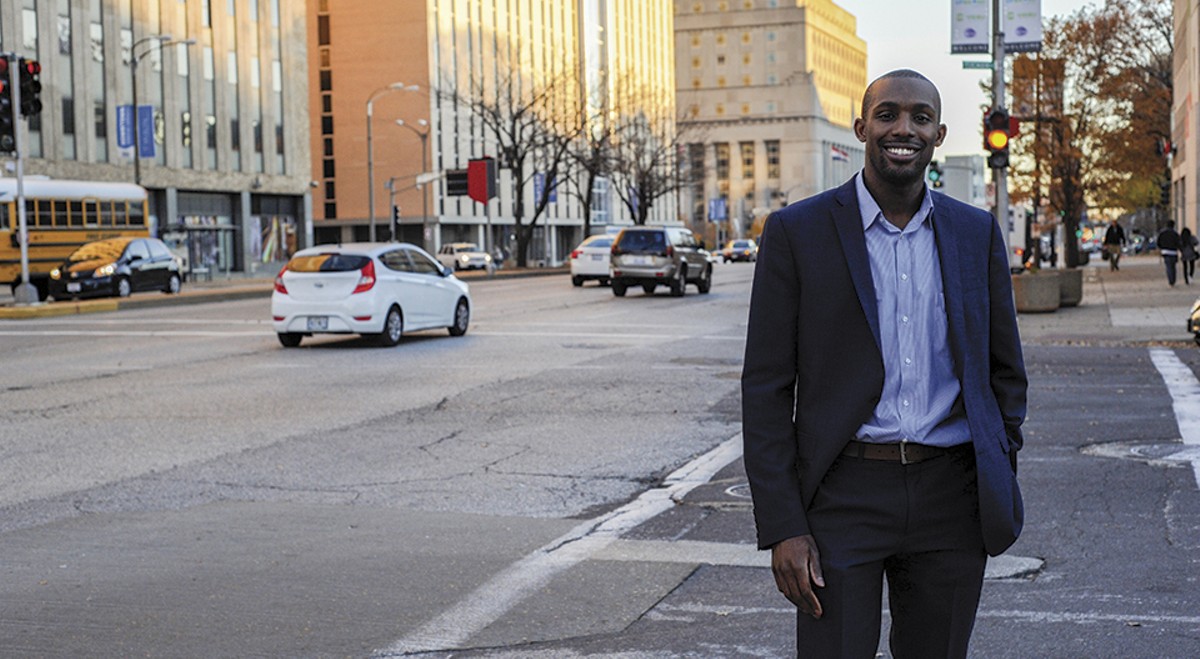In 2013, more than a year before their scrappy law firm catapulted to national prominence, Thomas Harvey and Michael-John Voss finally sat down to hash out the future of ArchCity Defenders. The two attorneys were in agreement. To really make a difference, the firm would have to grow. And, when it did, they shouldn't be the ones to lead it.
They had scribbled out the idea for the nonprofit firm on a napkin as law students at Saint Louis University, and, along with their classmate John McAnnar, they kept the idea alive even after graduating in 2009. They were idealistic. They were also angry.
From their earliest assignments as interns assisting on criminal defense cases, the trio had become increasingly distraught at the patterns they saw. Whether in the city or county court systems, their clients were overwhelmingly poor and black, with circumstances placing them outside the help of the state's overworked public defender system. These were not hardened criminals, but regular people living one interaction with police away — one traffic stop away — from being arrested on "failure to appear" violations for missing previous court dates. And once in law enforcement's grasp, they were being jailed by the thousands, destroying families and weakening communities, merely because they couldn't afford to pay fines and bail fees.
Of course, the three were not the first law school students to take a hard look at the criminal justice system and see endless lines of impoverished minorities staring back. But where others move on to cushy corporate jobs and stable salaries, the trio set to embodying ArchCity Defenders' mission statement with fervor — "Combating the criminalization of poverty and state violence against poor people and people of color."
The mission was far too big for three lawyers (even with a collection of interns and volunteers offering assists). That much was obvious in 2013. But the prospect of expanding the organization wasn't just about raising funds or hiring attorneys. In the minds of its founders, it also meant finding someone to take the reins, someone who'd lived the battles they were fighting.
"If we're going to be ... a racial justice organization, that's going to serve predominately low-income communities of color, we need to have leadership that's more reflective of the community we serve," Harvey remembers thinking at the time. All three founders are white. "If we are going to be true to our principles, that was something we needed to do."
The plan would have to wait: The next four years would find ArchCity on the front lines of court battles challenging everything from modern-day debtor's prisons to the indiscriminate use of tear gas.
With Harvey as executive director, the firm made its name in the wake of protests that rippled across the region in August 2014. The protests, sparked by the police shooting of Michael Brown in Ferguson, drew intense scrutiny to the sprawl of court systems in the 91 municipalities scattered across St. Louis County — their penny-ante harassment of minority residents providing a vivid backdrop to the mantra that "Black Lives Matter."
As the firm's stature increased, ArchCity Defenders went from being mostly a three-man show to an indispensable source for both activists and policymakers trying to fix St. Louis' criminal justice system. Word about its good works spread.
In Boston, that word reached a St. Louis native attending one of the most prestigious law schools in the world. His name was Blake Strode.
On September 25, 2014 — the same day that the Ferguson police chief delivered a stilted video apology to Michael Brown's family — the Harvard student emailed ArchCity. "He wanted to see if there was any way to return to St. Louis after he graduated," recalls Harvey.
On a recent weekday, sitting behind the desk in his fifth-floor office within the Christ Church Cathedral, Harvey clicks through his inbox, finally finding the old email. "He and I talked a little bit, and we started exploring ways to bring him here," Harvey says, noting, "We didn't have enough money to pay someone, certainly not a Harvard graduate."
Harvey can't help but smile at the improbability of it all. Strode — who has just been named the firm's incoming executive director, replacing Harvey — felt in some ways like the answer the co-founders had been looking for ever since they dreamed up their firm almost a decade ago. If anything, he was almost too good to be true.
"That wasn't what I was envisioning, having someone who was from St. Louis, went to Harvard and wanted to come back," says Harvey. "I don't think I ever could have imagined someone like Blake."






